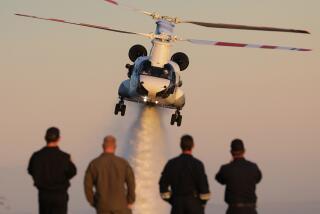Dispute threatens emergency flights for injured children
A business dispute between two aviation companies at Van Nuys Airport is threatening emergency helicopter flights for injured and severely ill children from around Southern California to Children’s Hospital Los Angeles.
The disagreement could result in flight delays or even cancellations, according to executives at Helinet Aviation, which owns and operates 15 helicopters at the airport.
Flights carrying donated organs for transplantation could also be affected, Helinet executives said. Helinet picks up organs from hospitals around the region and flies them to UCLA Health System, Cedars-Sinai Medical Center, Keck Hospital of USC and Loma Linda University Medical Center.
Children’s Hospital Los Angeles relies exclusively on two of Helinet’s helicopters to respond when babies are born with serious complications, infants choke or children are injured in car accidents. When children are taken to ill-equipped hospitals as far as Bakersfield and Palm Springs, the helicopters often transport doctors from Children’s Hospital to treat them and shuttle them back to Los Angeles.
“Every second can be the cutoff between them surviving and not surviving,” said Judy Sherif, who runs the hospital’s emergency transport program. “We want to be there as quickly as possible.”
Sherif said she had been told that the flights might not be able to get airborne as quickly as they do now. Currently, the helicopters are supposed to arrive on top of Children’s Hospital within 12 minutes to pick up a medical team. Helinet makes hundreds of flights for Children’s Hospital each year.
UCLA Health System relies heavily on Helinet, one of the main companies that picks up organs for transplants, said Jeff Butler, executive director of clinical services. Helinet and other companies can transport organs and transplant teams in a fraction of the time it would take to drive between facilities.
“In organ transplantation, time is of critical importance in getting organs from donors to recipients,” Butler said. “The faster and more efficient the transplant team can be in ... this crucial time period, the better outcomes for our patients.”
The dispute dates to 2005, when Helinet, through a new company named Basenet, purchased a lease at the airport. The next year, Pentastar bought a majority percentage in Basenet and the lease, and Helinet remained as a tenant and kept a percentage of the company, according to court papers.
The companies had planned to jointly redevelop the land, but when that didn’t happen, Helinet President Alan Purwin said he decided to sell his portion in Basenet back to Pentastar.
On March 9, Pentastar, through Basenet, sent a letter instructing Helinet to move its helicopters from the ramps where they sit ready to depart. When it didn’t comply, Helinet received another letter threatening eviction and legal proceedings.
Pentastar Aviation declined to comment.
Purwin said that if he has to move the helicopters, they will not be able to get off the ground as quickly.
“It is not practical or realistic to put every one of our helicopters in a hangar,” Purwin said. “I am not going to put a kid’s life in danger or somebody who has been waiting for a heart for three years on a transplant list. I am not going to be the guy who could negatively affect that outcome.”
In an attempt to stop the eviction, Helinet has filed a lawsuit against Pentastar and Basenet. Purwin said he is scrambling to find another space for his fleet of helicopters and his team of pilots, but that it isn’t easy.
“It’s not like you can just call the guy down the street and say, ‘Hey can I come over with my 50 people and 15 helicopters?’ ” he said.
More to Read
Sign up for Essential California
The most important California stories and recommendations in your inbox every morning.
You may occasionally receive promotional content from the Los Angeles Times.










